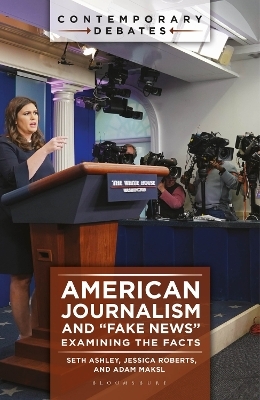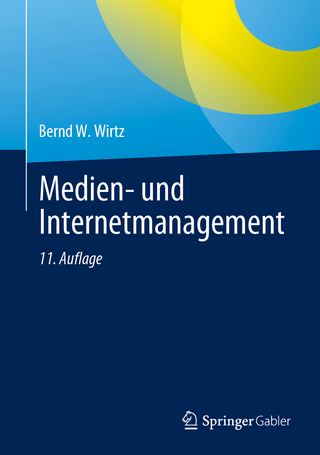
American Journalism and "Fake News"
ABC-CLIO (Verlag)
978-1-4408-6183-3 (ISBN)
A part of ABC-CLIO's Examining the Facts series, which uses evidence-based documentation to examine the veracity of claims and beliefs about high-profile issues in American culture and politics, this volume examines beliefs, claims, and myths about American journalism and news media. It offers a comprehensive overview of the field of American journalism, including contemporary issues and historical foundations, and places modern problems such as "fake news" and misinformation in the context of larger technological and economic forces.
The book illustrates the strengths and weaknesses of journalistic practices so readers can feel empowered to navigate the complex information environment in which we live and to understand the level to which various news sources can (or can't) be trusted to provide accurate and timely coverage of issues and events of import to the public and the nation. These skills and knowledge structures are necessary for any citizen who wishes to be an informed participant in a self-governing democratic society.
Seth Ashley, PhD, is associate professor of journalism and media studies at Boise State University. Jessica Roberts, PhD, is assistant professor of communication studies in the School of Human Sciences, Universidade Católica Portuguesa in Lisbon. Adam Maksl, PhD, is an associate professor of journalism and media at Indiana University Southeast, where he teaches digital journalism and social media classes.
How to Use This Book
Introduction: Journalism's Role in Democratic Society
1 Journalists: What They Do and Whom They Work For
Q1. Are Journalists Representative of the Population They Serve?
Q2. Can Anyone Be a Journalist?
Q3. Do Individual Journalists Have the Power to Decide What Is Published or Aired?
Q4. Are Journalists Objective?
Q5. Are Journalists Expected to Follow Any Formal Ethical Guidelines in Their Work?
Q6. Do Traditional Newspapers Still Play a Role in Modern Journalism?
Q7. Do Public Relations Professionals Influence Journalists?
2 News Media Law and Economics
Q8. Does the First Amendment Give Journalists Any Special Legal Rights?
Q9. Does the Federal Government Regulate News Media?
Q10. Is America's News Media Landscape Dominated by Just a Few Corporations?
Q11. Do Newsgathering Organizations Only Publish Content That Will Make Them Money?
Q12. Is the American News Media System the Same as That of the Rest of the Developed World?
3 News Audiences
Q13. Do Most Americans Get Their News Online Today?
Q14. Do Liberals and Conservatives Consume Different Media?
Q15. Do Americans Trust the News Media?
Q16. Do News Media Organizations Shape Their Coverage to Attract Viewers with Certain Political Beliefs?
Q17. Do Audiences Influence News Content?
4 News and Politics
Q18. Are All News Media Biased?
Q19. When Covering Elections, Do News Media Typically Focus on the Issues and Policies That Affect Citizens?
Q20. Do Politicians Set the Agenda for Journalists?
Q21. Is the Relationship between Politicians and Journalists Adversarial or Cooperative?
Q22. Do Journalists Have Valid Reasons to Use Anonymous or Unnamed Sources?
Q23. Can Politicians Circumvent Journalists by Using Social Media?
Q24. Do News Media Increase Political Polarization?
5 "Fake News" and Misinformation
Q25. What Is "Fake News"?
Q26. Does President Trump Use the Term "Fake News" to Try to Discredit Any Reporting That Is Critical of Him or His Administration?
Q27. Did "Fake News" Influence the Outcome of the 2016 Presidential Election?
Q28. Are "Fake News" and Other Types of Misinformation More Easily Spread because of Social Media?
Q29. Can Anything Be Done to Stop the Spread of "Fake News"?
6 Representation and Reality in News Coverage
Q30. Is the World Really as Dangerous as News Media Seem to Suggest?
Q31. Do News Media Accurately Represent Scientific Knowledge and Consensus?
Q32. Are Minorities and Women Accurately Represented in News Media?
Q33. Does News Coverage of the Economy Reflect the Average American's Reality?
Q34. Do News Media Accurately Represent the Realities of War?
7 The Future of Journalism
Q35. Is American Journalism Dying?
Q36. Will Technological Changes Continue to Influence How Journalism Is Practiced?
Q37. Will Journalism Play a Significant Role in the Future of American Democracy?
Index
About the Authors
| Erscheinungsdatum | 03.01.2019 |
|---|---|
| Reihe/Serie | Contemporary Debates |
| Sprache | englisch |
| Maße | 156 x 235 mm |
| Gewicht | 652 g |
| Themenwelt | Sozialwissenschaften ► Kommunikation / Medien ► Journalistik |
| ISBN-10 | 1-4408-6183-8 / 1440861838 |
| ISBN-13 | 978-1-4408-6183-3 / 9781440861833 |
| Zustand | Neuware |
| Haben Sie eine Frage zum Produkt? |
aus dem Bereich


